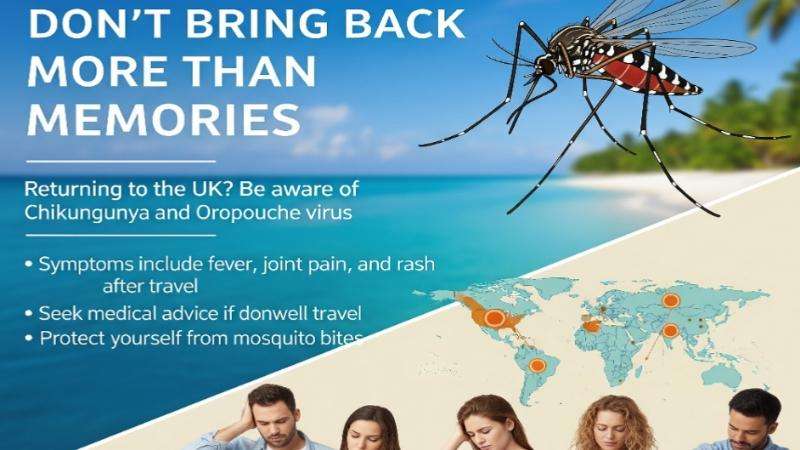UK Health Officials Warn British Bangladeshi and UK-based Travellers of Mosquito-Borne Illnesses After Surge in Chikungunya and New Oropouche Virus Cases
UK health officials are issuing a critical warning to travellers, especially those from the British Bangladeshi and other communities returning from summer holidays in countries like Bangladesh, India, and Pakistan. A significant rise in cases of Chikungunya, a debilitating mosquito-borne illness, has been reported in the UK. The UK Health Security Agency (UKHSA) has also confirmed the first-ever cases of the emerging Oropouche virus in Britain, further underscoring the growing risk of tropical diseases being imported into the country, Daily Dazzling Dawn understands.
Between January and June of this year, the UK has seen 73 cases of Chikungunya, a sharp increase from the 27 cases reported during the same period last year. The majority of these cases, concentrated primarily in London, have been linked to travel to Sri Lanka, India, and Mauritius. For the British Bangladeshi community, this is a particularly timely warning, as a recent Chikungunya outbreak has been confirmed in Dhaka, the capital of Bangladesh, and the country saw a rise in cases last year.
Dr. Philip Veal of the UKHSA described Chikungunya as a "nasty disease" that causes sudden fever and severe joint pain, a condition so painful its name translates to "that which bends up." While most people recover, symptoms can linger for months or even years. The virus, transmitted by mosquitoes, cannot spread directly from person to person, and the specific mosquito species that carry it are not established in the UK. Therefore, the risk of local transmission remains low, but the public health concern is focused on preventing infections abroad.
Adding to the alarm, the UKHSA has detected three cases of the Oropouche virus in travellers returning from Brazil. This new threat, spread by midges and mosquitoes, was historically confined to the Amazon region but is now spreading to other parts of South and Central America. Symptoms are similar to Chikungunya, including fever, headache, and muscle pain.
In response to these developments, medical professionals are strongly advising travellers to take precautions. The use of insect repellent, wearing clothing that covers exposed skin, and sleeping under bed nets are essential steps to avoid mosquito and midge bites. For those planning future trips to high-risk areas, two Chikungunya vaccines are now available in the UK from private travel clinics. Anyone who develops symptoms after returning to the UK should seek medical advice immediately and inform their doctor of their travel history. This advice is especially pertinent for the British Bangladeshi community, many of whom have family and community ties to regions currently affected by these diseases.







.svg)

